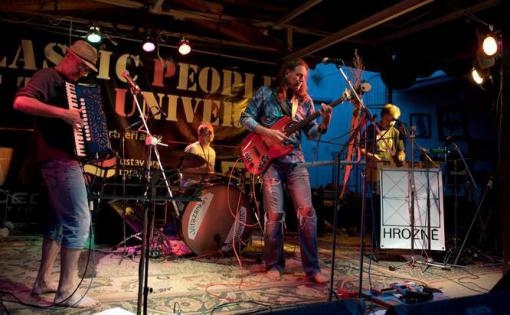The Brno group Hrozně slowly approach forty years of age – they started to give concerts in 1982. After several cassettes and unofficial recordings, they released a CD with their debut album Už není čas [There Is No Time Left] in 2013. Their new album named Ticho [Silence], which the band was working on over the last two years in the Indies studio, brings a surprise with its cleaner sound and clearly audible tension in the structure of the songs.
“We have reached a phase when we want to make our songs as sophisticated as possible. We'll see what comes out of it”, revealed the singer and metallophone player Martin Kozlovský in an interview for Brno – město hudby in 2017. While the prevailing part of the previous album was created over a single weekend ("I think, however, the result was not bad at all," the bass player Jaromír Řehoř commented on that occasion), on the new album, the band worked gradually and in smaller portions. In spite of that, the recordings have not lost anything of the compact sound that had been successfully transferred to the previous album, and in addition to that, the listener gets a lot of not really negligible details. Individual instruments are more readable, the vocals are clearer and especially the drum kit has become a sovereign carrier of the action alongside the bass guitar, accordion, metallophone and voice. After all, it is probably no coincidence that the album starts with a rhythmic figure, joint only after a few bars Pavel Magnusek's drums by the other instruments.
However, the changes described above are far from radical. The recording technology, a good sound engineer (Dušan Souček) and the high-quality studio moved the Hrozně's music forward, fortunately without fading anything of the essence of the band, which in the 1980s belonged to the Brno's independent scene, but at the same time stood out of the aside alternative streams. The band's unusual instrumental line-up has not got exhausted even with the passing of time; in addition, Martin Kozlovský, apart from the metallophone uses the ringing sound of a wooden thumb piano (also called mbira or calimba). Kozlovský's declamatory way of singing (or half-recitation) perfectly corresponds to the distinctly rhythmic and staccato character of the songs and the moment when the listener could have a feeling of "still the same song", Jaromír Řehoř takes over the microphone with his different voice timbre. An even bigger surprise is then the song Má milá [My Sweetheart] with the guitar player Myšilov appearing as a guest (yes, there is a genuine guitar solo on the album of a band that does not have a guitar) and an episode role of a female voice (Erika Kolaciová) in the same track.
Similar to the case of the last album Už není čas, the new one entitled Ticho brings about a mixture of some new and some very old songs (in fact, the tracks Už mi z toho jebe [I'm Fed Up With This] and Stejné ženy, stejní muži [The Same Women, The Same Men] used to be on the band's concert playlist already in the 1980s). The timeless - or better stemming out of the "normalisation" timelessness – poetics of Martin Kozlovský is surprisingly valid nowadays as well. In addition, his art of abbreviation ("We are also involved in the game / we also cannot stand each other / We are also involved / We also cannot") resonates with the somewhat repetitive music of the band, built on rhythmic details.
However, it would be unfair to restrict the Hrozně's songs to structures, rhythm and abbreviation. Martin Kozlovský perfectly describes in his lyrics the feelings of alienation (Stejné ženy, stejní muži), internal emptying (Blues) and pain (Dojít až tam [To Get As Far As There]), but his role as a story-teller is also interesting. In spite of that, a song does not have to contain one consistent story, but rather a few small epic scribbles that, for example, make the three and a half minute track Akrobat [Acrobat] become a collection of short stories in a nutshell. Also noteworthy is the maximally economical text of the song Opera: "I said to myself I would write an opera / which someone would record for sure. It will in fact be an opera / to mark an important / milestone / anniversary!" Even more economical is the "text" of the song Hovenfóra [Crapforums], which, however, would work just as well, and perhaps better, in an instrumental version. Similarly, from the rest of the album is somewhat standing out the rhyme-song Tělo [The Body] (with lyrics by Jaromír Řehoř and Pavel Straka having the structure of rhymes AAAA AAAA AAAB).
Hrozně didn't walk with the mainstream crowds in the normalisation era, and later even disappeared from the scene for a number of years, and nowadays they stand a little aside of the main interest of media and fan crowds (they may only dream of the crowded Fléda club that the group Dunaj experienced after their recent comeback). However, they remain a sure bet of the Brno scene, even after more than three decades they still have something to say and – if we watch them carefully – they always come with something new without betraying themselves. That is why it is good to keep track of them. They may not write an opera to mark the upcoming important milestone anniversary ("already" in three years' time!), but their current album is worth it.
Hrozně – Ticho, published by: Indies Happy Trails, 2019, 12 tracks, total playing time: 41:27
































No comment added yet..